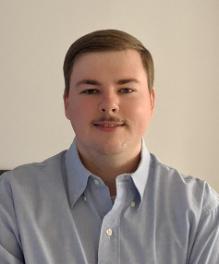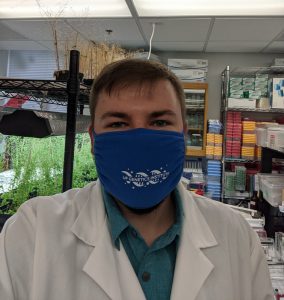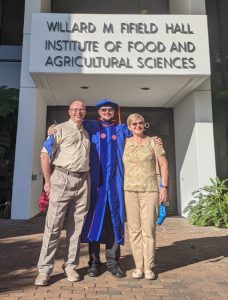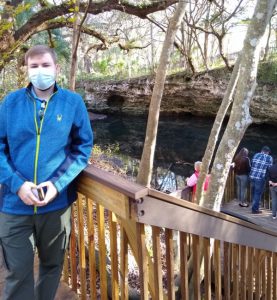 Welcome to Tautvydas Shuipys, a postdoctoral associate in the Food Science and Human Nutrition department and the latest addition to our Discover FSHN Series! Tautvydas joined the lab of Dr. Naim Montazeri this winter and hit the ground running with his research into SARS-CoV-2 and the food industry. Read on to learn about his research, his journey to UF, what he feels the public should know about SARS-CoV-2 and packaged foods, and the most unusual food he’s ever eaten!
Welcome to Tautvydas Shuipys, a postdoctoral associate in the Food Science and Human Nutrition department and the latest addition to our Discover FSHN Series! Tautvydas joined the lab of Dr. Naim Montazeri this winter and hit the ground running with his research into SARS-CoV-2 and the food industry. Read on to learn about his research, his journey to UF, what he feels the public should know about SARS-CoV-2 and packaged foods, and the most unusual food he’s ever eaten!
Would you tell me about your current work as a postdoctoral associate?

My postdoctoral research project with Dr. Montazeri is part of a larger collaboration with members from North Carolina State University, Rutgers, the State University of New Jersey, and the University of Nebraska-Lincoln aimed at studying SARS-CoV-2, the virus that causes COVID-19. Specifically, the goal is to better characterize virus persistence, inactivation, and transmission on surfaces important to the food industry.
Given the risks associated with SARS-CoV-2, we cannot study the virus directly in our lab. Instead, I’m using other surrogate coronaviruses like Murine Hepatitis virus and Human Coronavirus 229E as well as more general enveloped viruses like the bacteriophage phi6. Studying how these surrogates respond will give us a better idea of how SARS-CoV-2 may respond and will allow our food industry stakeholders to optimize their virus prevention programs. Eventually, we hope to test the applicability of our results by partnering with a lab equipped to handle SARS-CoV-2 directly.
Tell me about what you did before starting your postdoctoral position.
I started this position immediately after completing my Ph.D. in the Genetics and Genomics Graduate Program here at UF. Before I joined Dr. Montazeri’s lab, I worked with Dr. Kevin Folta in the Horticultural Sciences Department. My project aimed to characterize a new small molecule that could alter how plants grow and develop under red light. This peptide, when produced within our model plant species, Arabidopsis thaliana, seemed to reduce sensitivity to red light making the seedlings appear more similar to those grown in complete darkness. With plants reliant on light not only for photosynthesis but also for cues to coordinate proper development, I was interested to study the exact effect of this new peptide.
[T]he best ways to keep safe are the ones that have been recommended for months: practice social distancing, wear a mask in public places, and wash your hands before touching your face.
More broadly, my project analyzed the feasibility of a new system to generate small peptides that would affect plant growth through expression of short, random DNA sequences. During my studies, I was invited to present my work at the inaugural ASPB Plant Synthetic Biology conference in 2019 and last year’s virtual Plant Biology conference. In my spare time, I also had the opportunity to write a handful of articles for the Genetic Literacy Project website covering topics in genetics, biotechnology, and plant biology.
Will you share how you chose the FSHN department at UF for your postdoctoral work?

I actually first heard about the opening for a postdoc in this department the same week I was scheduled to hold my Ph.D. defense. I was in the midst of sending my committee a reminder when I saw the email come in advertising this position. The announcement piqued my interest because the persistence of SARS-CoV-2 on food and other surfaces was one the first questions I tried to find answers for at the start of the pandemic. While my Ph.D. work was focused on plants, I have also been interested in microbiology and had some previous experience in the subject. Working with viruses was a natural extension of that experience while also aligning with my interests and allowing me to expand my skills.
More generally, the reason I became interested in science and research in the first place was the desire to contribute to something much bigger than myself and expand our wealth of knowledge. Being able to make a meaningful impact in our understanding of this virus that has so significantly affected the lives of people around the world seemed like an especially fitting start to my post-graduate work. Not to mention it was a sort of poetic justice since the virus halted my planned experiments during my final year! I ended up inviting Dr. Montazeri to attend my defense and everything just went forward from there.
What do you believe is the most important fact the public should know about SARS-CoV-2 and packaged foods?

In the past few months, you may have seen news articles reporting that the SARS-CoV-2 virus or its RNA has been found on/in frozen food packages. This shouldn’t cause alarm or mean you should start disinfecting all of your groceries. The predominant way the virus spreads is person-person contact through aerosols. Thus far, there have not been any COVID-19 cases linked to transmission through contact with infected surfaces, and the presence of viral RNA does not necessarily mean the presence of live, infectious virus.
Here is where our research comes in. We are aiming to conclusively characterize viral survival across a battery of surface types and environmental conditions to assess exactly what level of risk there is to both food producers and consumers. For now, the best ways to keep safe are the ones that have been recommended for months: practice social distancing, wear a mask in public places, and wash your hands before touching your face.
How did you become interested in food safety and research?

I am originally from Šiauliai, Lithuania and immigrated to Chicago with my parents when I was five years old. Growing up, I always enjoyed science classes in school. For this reason, I did my bachelor’s degree in Biology with a molecular emphasis at Loyola University Chicago. I had the opportunity to participate in two undergraduate research experiences during this time: first studying whether a mutation in Staphylococcus aureus conveyed resistance to the antimicrobial agent triclosan and later working to characterize new families of retrotransposons in white clover. These experiences gave me a better understanding of how the scientific process works and reinforced my desire to conduct research as a career. So, after graduation, I moved to Florida to attend the Genetics and Genomics Graduate program here at UF.
What do you want to do in your career long term?
I really enjoy conducting research, especially being able to run experiments myself, and would like to continue doing so for my career. Thus, my current plan is to become an industry scientist or a research scientist at a governmental agency like the USDA ARS. I haven’t yet decided the exact field I will target but it will likely be in microbiology, virology, plant biology, or some combination of the three!
What do you like to do in your free time?

Having grown up in Chicago, I try to make the most of Florida’s pleasant weather. During the warmer months, I like going swimming every chance I get—either in the pool at my apartment or by driving out to the coast. When cooler, I enjoy going for walks at the numerous nature trails in and around Gainesville. Not having to deal with dreary, cold, and snowy winters is one of the best parts of living here! If not out swimming or hiking, I can also be found reading novels like those by Clive Cussler or Michael Crichton as well as playing video games online (which has been a great way to keep in touch with my friends during the pandemic).
What is the most unusual food you’ve ever eaten, and how did you come across it?

The most unusual food that I’ve eaten, though probably not unusual to those from Florida, is gator tail. I never knew people ate alligator meat, let alone order it at restaurants, prior to interviewing for the graduate program at UF. During a dinner with students from the program, they decided to order fried gator tail to share as an appetizer. At first, I thought that it was a just a fun name for some other menu item they created but was surprised it actually had gator meat. Not only that, but it was also it was actually not bad!
Note: Some images in this post were taken prior to national guidelines of face coverings and social distancing.
Interested in learning more about FSHN’s Food Science programs? Read more here and here and here!
P.S. The Discover FSHN Series highlights the unique experiences of UF’s Food Science and Human Nutrition students, faculty, staff, and alumni. Want to read more about the amazing work going on in the FSHN department? See our previous features below:
Undergraduate Students:
Shannon Mai, Dietetics
Alex Colon, Dietetics and Jenny Duong, Food Science
Jackie Shannon, Nutritional Sciences
Jennifer Jordan, Food Science
Lily Tucciarone, Dietetics
Graduate Students:
Savanna Curtis, Food Science (M.S.)
Carley Rusch and Matthew Beke, Nutritional Sciences (Ph.D.)
Alexa Hosey, Dietetics (MS/DI)
Vicnie Leandre, Food Science (M.S.)
Rufus Theophilus, Nutritional Sciences (Ph.D.)
Amber Fritsche, Dietetics (MS/DI)
Postdoctoral Associates:
Cameron Bardsley, Food Safety
Faculty:
Dr. Naim Montazeri, Food Science/Food Virology
Dr. Jeanette Andrade, Dietetics
Dr. Zhiyong Cheng, Nutritional Sciences
Dr. Juan Andrade Laborde, Global Nutrition
Dr. Razieh Farzad, Food Science
Staff:
Sharyn Passeretti, Lab Specialist
Herschel Johnson, Manager of Student Services
Brandy Johnson, Administrative Assistant
Alumni:
Becca Solch, Nutritional Sciences, Postdoctoral Research
Hannah Cooper, Dietetics, Private Practice
Richie Li, Food Science, Product Development
P.P.S. Learn more about FSHN’s renowned programs below!
Undergraduate Programs:
Dietetics
Food Science
Nutritional Sciences
Graduate Programs:
M.S. Dietetic Internship Program
M.S. Food Science and Human Nutrition
Ph.D. Food Science
Ph.D. Nutritional Sciences
 0
0
